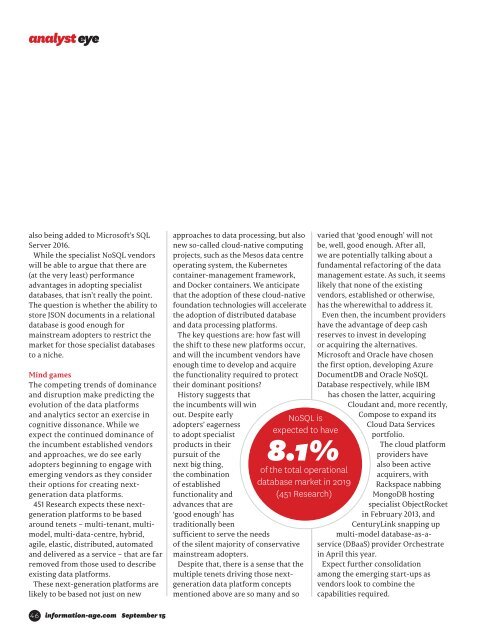A NEW BREED
1LxhtJc
1LxhtJc
- No tags were found...
You also want an ePaper? Increase the reach of your titles
YUMPU automatically turns print PDFs into web optimized ePapers that Google loves.
analyst eye<br />
also being added to Microsoft’s SQL<br />
Server 2016.<br />
While the specialist NoSQL vendors<br />
will be able to argue that there are<br />
(at the very least) performance<br />
advantages in adopting specialist<br />
databases, that isn’t really the point.<br />
The question is whether the ability to<br />
store JSON documents in a relational<br />
database is good enough for<br />
mainstream adopters to restrict the<br />
market for those specialist databases<br />
to a niche.<br />
Mind games<br />
The competing trends of dominance<br />
and disruption make predicting the<br />
evolution of the data platforms<br />
and analytics sector an exercise in<br />
cognitive dissonance. While we<br />
expect the continued dominance of<br />
the incumbent established vendors<br />
and approaches, we do see early<br />
adopters beginning to engage with<br />
emerging vendors as they consider<br />
their options for creating nextgeneration<br />
data platforms.<br />
451 Research expects these nextgeneration<br />
platforms to be based<br />
around tenets – multi-tenant, multimodel,<br />
multi-data-centre, hybrid,<br />
agile, elastic, distributed, automated<br />
and delivered as a service – that are far<br />
removed from those used to describe<br />
existing data platforms.<br />
These next-generation platforms are<br />
likely to be based not just on new<br />
approaches to data processing, but also<br />
new so-called cloud-native computing<br />
projects, such as the Mesos data centre<br />
operating system, the Kubernetes<br />
container-management framework,<br />
and Docker containers. We anticipate<br />
that the adoption of these cloud-native<br />
foundation technologies will accelerate<br />
the adoption of distributed database<br />
and data processing platforms.<br />
The key questions are: how fast will<br />
the shift to these new platforms occur,<br />
and will the incumbent vendors have<br />
enough time to develop and acquire<br />
the functionality required to protect<br />
their dominant positions?<br />
History suggests that<br />
the incumbents will win<br />
out. Despite early<br />
adopters’ eagerness<br />
to adopt specialist<br />
products in their<br />
pursuit of the<br />
next big thing,<br />
the combination<br />
of established<br />
functionality and<br />
advances that are<br />
‘good enough’ has<br />
traditionally been<br />
sufficient to serve the needs<br />
of the silent majority of conservative<br />
mainstream adopters.<br />
Despite that, there is a sense that the<br />
multiple tenets driving those nextgeneration<br />
data platform concepts<br />
mentioned above are so many and so<br />
NoSQL is<br />
expected to have<br />
8.1%<br />
of the total operational<br />
database market in 2019<br />
(451 Research)<br />
varied that ‘good enough’ will not<br />
be, well, good enough. After all,<br />
we are potentially talking about a<br />
fundamental refactoring of the data<br />
management estate. As such, it seems<br />
likely that none of the existing<br />
vendors, established or otherwise,<br />
has the wherewithal to address it.<br />
Even then, the incumbent providers<br />
have the advantage of deep cash<br />
reserves to invest in developing<br />
or acquiring the alternatives.<br />
Microsoft and Oracle have chosen<br />
the first option, developing Azure<br />
DocumentDB and Oracle NoSQL<br />
Database respectively, while IBM<br />
has chosen the latter, acquiring<br />
Cloudant and, more recently,<br />
Compose to expand its<br />
Cloud Data Services<br />
portfolio.<br />
The cloud platform<br />
providers have<br />
also been active<br />
acquirers, with<br />
Rackspace nabbing<br />
MongoDB hosting<br />
specialist ObjectRocket<br />
in February 2013, and<br />
CenturyLink snapping up<br />
multi-model database-as-aservice<br />
(DBaaS) provider Orchestrate<br />
in April this year.<br />
Expect further consolidation<br />
among the emerging start-ups as<br />
vendors look to combine the<br />
capabilities required.<br />
46 information-age.com September 15


